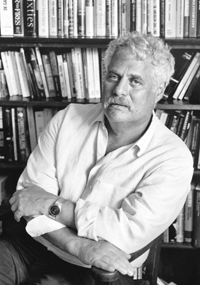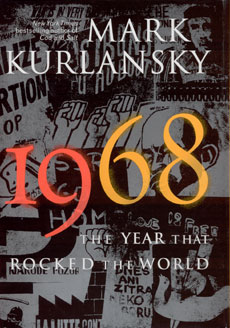A Conversation with Mark Kurlansky
Author of 1968: The Year That Rocked the World
Why 1968?
1968 was a unique year in history when explosive social movements shook almost every
country in the world. It was the bloodiest year of the Vietnam War, the year of the Tet
Offensive, the year of the Biafran civil war in which a million children starved to death,
a critical year in the Middle East, the year of uprisings in the Communist bloc, Prague
Spring, and the Soviet invasion. It was the year of student riots in Rome, Madrid,
Berlin, Paris, London, Mexico City , Berkeley, New York. The year of Martin Luther
King and Robert Kennedy's assassinations, and of Nixon's election. A year of Yippies
and the violent Chicago convention and the emergence of the feminist movement. The
central question is, why did all of these events happen in diverse countries over diverse
issues but often in very similar ways at the exact same moment?
What caused this worldwide event?
The various movements had very little contact with each other. It was an age of less
communication than today. But they did all have the same influences. Four things
stand out.
The Civil Rights movement that was viewed on television and covered in the press
around the world had made the rebel protestor a hero to be emulated. The Vietnam
War, in which the U.S. killed more Vietnamese people every week than died in the
September 11 World Trade Center attack, was despised and deplored by people all over
the world and became a rallying point. The so-called generation gap made for a sense
of alienation among young people. All of this occurred at a critical moment in the
development of television so that it had an impact never before felt.
What was the importance of the Civil Rights movement?
The Civil Rights movement was one of the first to become skilled at playing to modern
television. Martin Luther King, himself a master of television, had complained to CBS's
Daniel Schorr that television was promoting the wrong type of Black leader. But the
The Vietnam War erupted at the height of the age of decolonization when French,
British, Dutch, Belgian, and other colonies around the world were demanding and
getting their independence. Their cause was embraced by many of the young
generation. Vietnam was a former French colony struggling for independence, and the
United States was this new entity called a superpower dropping more bombs on this
little impoverished land than had been dropped on all of Europe in World War II. The
Vietnam War was the one point of agreement among members of very disparate
movements. In 1968 in the U.S. the Civil Rights movement was divided between the
advocates of non-violence and those of Black Power. But they could agree on their
opposition to the war .Movements united in most of the world over Vietnam. In
Britain, France, Germany, and Mexico protest started against the American war in
Vietnam and later moved on to more local issues.
Were the generations that different?
Probably more different than at any other time in history. The people raised in the
1930s saw everything in a very different way than those raised in the 1950s. World War
II completely changed the world. To the World War II generation, the great failure was
not declaring war against the Germans sooner. That was one of the reasons that
generation went into Vietnam. But the post-war generation raised in a nuclear age saw
war as an irrational response. To them, the great lesson of World War II was that not
enough had been done to protest the Nazis and speak out against them. The older
generation viewed the cold war as a way of holding the line against Communism much
in the same way they thought their fathers should have held the line against fascism. To
the generation of the 1950s and 1960s, the cold war was absolute idiocy. They were
more interested in the emergence and empowerment of small, poor nations than in the
struggle of two bullying superpowers.
What was different about the media in 1968?
The 1960s saw the dawning of the media age. Marshall McLuhan , who invented such
phrases as " global village" and " the medium is the message," was the great prophet of
the day. Television's capacity was greatly expanding because satellites made it possible
to transmit live television anywhere in the world. Video tape, which was cheap,
reusable, and required no processing, was replacing film. Lyndon Johnson in 1967 and
'68 was the first president to make the State of the Union address a television event.
The coverage included commentaries by notables who were the beginning of television
news pundits, so-called talking heads.
Four extraordinary television events in 1969 changed the role of media in society: The
coverage of the Tet offensive brought war into living rooms in a way that had never
before happened. Seventeen minutes of a police rampage against demonstrators during
the Chicago convention was almost instantly transmitted around the world. The Soviet
version of their invasion of Czechoslovakia was exposed by television footage
smuggled out of the country .The Apollo missions to the moon broadcasted live back to
Earth.
What was happening in the Soviet bloc?
It was remarkably similar to the Western bloc. While Western youth were questioning and starting to reject capitalism, youth in the Soviet bloc, especially those from good
Communist families, were beginning to question and criticize their system. There were
student uprisings in the streets of every city in Poland. The Romanians and
Yugoslavians were demanding more independence. Czechoslovakia under Alexander
Dubcek was redefining Communism, going back to the Marxist idea of a state with free
press and individual liberty .The Soviets, fearing the Czech model would spread,
crushed it. The irony is that the Czechs were extremely loyal to the Soviets and their
model, had it spread, might have saved the Soviets. Instead, we now know, the Soviet
invasion of Czechoslovakia was the beginning of the end.
What was happening in the Middle East?
The Middle East in 1968 was in the aftermath of the Six Day War. The Six Day War was one of history's most dramatic examples of Ghandi's teaching that peace could not be
achieved if an enemy was humiliated in defeat. Israel had taken a great deal of valuable
land and now wanted to give it back in exchange for peace. But the Arabs were not
accepting peace, or even talking about it. The Palestinians and the leading Arab states
made it clear in their statements that they were committed to an armed struggle to
destroy Israel. In 1968, Yasir Arafat, a young guerrilla fighter who had gotten his start
only a few years earlier with a failed attempt to blow up a water pump, took control of
the PLO. Increasingly, the strategy was shifting from conventional warfare to such
guerilla raids. 1968 was the year the word "Palestinian" became widely used.
Palestinians are ethnically the same as Jordanians and before had been widely referred
to as " Arabs in Israel." The newspaper dateline for stories from the West Bank was
" occupied Jordan." Palestinian was a word used for terrorist commandos. But in this
year, in which the struggle of emerging nations was fashionable, the Arabs in Israel
were increasingly thought of as a struggling nation.
What was the Biafran War?
Biafra was where the West learned of the tragedy European colonialism had inflicted on Africa. As Europeans left, they divided their former colonies into countries with no
regard for their ethnic composition. Nigeria was considered the most promising of the
new African countries because it was rich in oil. But the oil region was dominated by
the Ibos, whereas the rest of the country was dominated by Hausas and Yorobas. In
1967 the Ibos broke away from Nigeria and named their new country Biafra. In 1968
the Nigerian army was able to control air, land, and sea access to Biafra but was not able
to defeat them. And so they began to starve them, preventing any relief food from
getting in. One million children starved to death in Biafra.
How did 1968 change the world?
It was the beginning of the end for the Soviet Bloc. The student movement in Mexico
laid the groundwork for enormous changes there. In the U.S. it did the opposite of
what it was supposed to do. Instead of starting a revolution it entrenched the right and
changed the entire configuration of American politics.
How did it change American politics?
Up until 1968 there were not huge differences between the Republican and Democratic parties. There were pro- and anti-war leaders on both sides. The Republican party had
considerable black support. The disastrous 1968 campaign of Nelson Rockefeller,
according to polls the most favored politician, destroyed the liberal wing of the
Republican party .The NeuJ Yark Times predicted accurately that it was the end of
Republican liberalism. Nixon adopted a strategy followed by every national
Republican since, of appealing to white Southern racism with an anti-civil rights
rhetoric. No Democrat has since secured a majority of white Southern voters. Nixon
targeted the Supreme Court, destroying Abe Fortas and attempting to undo Douglas
with his dirty tricks team. The legal adviser behind these moves, William Rehnquist,
was appointed to one of the four seats that opened during Nixon's term.
1968 seems like a tragic year, and yet there is a nostalgia for it.
It was a tragic year. Two of the most inspiring leaders this country has ever produced
were murdered. One million children starved to death in Biafra. Fifteen thousand
American servicemen died for no reason in Vietnam that year and killed a few hundred
thousand Vietnamese. And yet there was this one lesson that has inspired people ever
since. People felt empowered that they did not have to sit at home, infuriated, watching
events unfolding. They could get out on the street and march or even scream and they
would be heard.
What are the relevant lessons of 1968?
There are many. We learned that if you try to change the world the people who
presently control it will stop at nothing to prevent you. The military learned a lot. They
learned that if you do not have a draft, college students will not feel a personal
involvement and war will be quietly left to the poor. They learned not to give body
counts and in fact to give almost no information about enemy casualties so that the
impression is given that war is bloodless. The public, on the other hand, should have
learned. When we hear the government talk about "staying the course" in Iraq to build
democracy by helping our friends the Iraqis, we should remember that we have heard
all these lies before. Most importantly, we learned that people banded together do have
a voice even when there is not democracy. Probably the most popular writer of 1968,
even though he was already dead, was Albert Camus, who once wrote, "The longing
for rest and peace must itself be thrust aside; it coincides with the acceptance of
iniquity .Those who weep for the happy periods they encountered in history
acknowledge what they want: not the alleviation but the silencing of misery."




